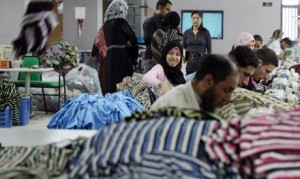
(AFP Photo)
By: Nehal Mounir
Minister of Investment Ossama Saleh is set to hold a meeting on Sunday with representatives from the Textiles Workers Union, to address issues plaguing the sector “in an attempt to help save it from collapse”.
Abd Al-Fatah Ibrahim, the president of the union, said that members would review problems currently being faced in the production of textiles, which were “the result of decades of government mismanagement.” These include the failure to purchase or renovate new equipment, in addition to ceasing to produce the short and mid staple cotton used in the production of a number of textile products.
He added that Egypt’s finance minister needed to exchange upwards of EGP 70m earned by the country’s public sector, in order to expand purchases of cotton, in addition to purchasing new, modern technology for Egypt’s factories, which have not been updated since the 1990s.
Workers said that they would not end their sit in until the meeting with the minister and union representatives was concluded.
Ibrahim went on to say that clear measures needed to be taken governing the purchase of cotton, in order to combat the monopolistic practices of Egypt’s private sector, which recently took to purchasing large quantities of cotton from the country’s Ministry of Agriculture, after the former stopped purchasing cotton made by the country’s farmers.
Ibrahim added that these anti-competitive practices had helped contribute to the closing of the Kafr El-Dawwa textile company, which employed over 8,000 workers. He explained that in order to operate, the factory needed to obtain a total of 10,000 quintals of cotton and 200 tonnes of polyester per month, but could not secure the supplies.
Ibrahim went on to say that the Mahala Yarn Company, which employs over 20,000 employees, is also set to shut down its operations within the next two days as a result of shortages in cotton and raw materials.




